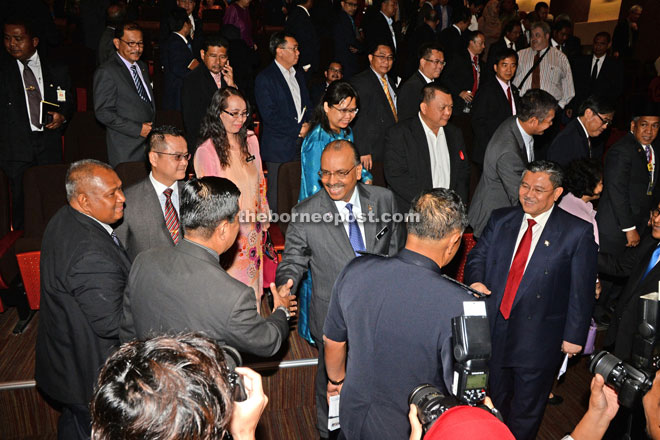
Ali (centre) greeting the participants upon his arrival for the KSN Annual Lecture. Also seen is Morshidi (right). — Photo by Penerangan
KOTA SAMARAHAN: Civil servants are called on to be more efficient and effective in providing the best services to the people as well as to be more resilient in the face of external strains and uncertainties.
In order to achieve this objective, Chief Secretary to the Government Tan Sri Dr Ali Hamsa said two pro-active steps should be taken to transform the government service.
“Firstly, transforming our processes, to modernise or improve the performance of administrative systems, to address persistent underlying inefficiencies as well as respond to external changes such as the digitalisation of media.
“Secondly, focusing on structure, which runs deeper; that is to re-evaluate our organisational composition, including people
and component agencies in order to be leaner, more agile, networked and performance-driven,” he said at the KSN (Ketua Setiausaha Negera) Annual Lecture at the National Institute of Public Administration (Intan) Sarawak auditorium here yesterday.
However, he said that transformation must not compromise productivity and efficiency of the public service nor the benefits to the rakyat.
“Even if we face the pressing need to tighten our belts, there is always room for creative and innovative solutions. For instance, under the recalibrated Budget 2016, the government is expected to realise savings of RM4 billion across the operations of the 24 ministries and a further RM5 billion reduction in development expenditure.
“This puts us in creative problem-solving mode – to make difficult decisions on what to cut, what to reduce and how to continue to deliver the services that the people expect but with lower spending,” he remarked, stressing that there can be neither room nor tolerance for extravagance, mismanagement or wastage.
In the face of present challenges, Ali also urged civil servants to leverage on every resource that they have to deliver the highest possible levels of service, in the most efficient way possible, and at a fraction of the cost that they are accustomed to operating at.
“Let us continue to prioritise the people and truly illustrate what ‘low cost, high impact and rapid execution’ means.”
Meanwhile, State Secretary Tan Sri Datuk Amar Morshidi Abdul Ghani in his welcoming address said civil servants had to have the courage and will power to embrace change and constantly re-examine the way they work.
“We cannot adopt a ‘business as usual’ attitude. It is for this reason that state civil servants have embarked on a transformation agenda to ensure that we remain relevant and responsive to the changing demands of the environment and also our rakyat.”
He also pointed out that the state government had formulated the Sarawak Socio-Economic Transformation Plan (SETP), a long term perspective plan which will be executed in phases starting with the Eleventh Malaysia Plan (2016-2020).
“SETP aims to accelerate income growth and reduce income disparity. The plan covers all sectors of our economy and outlines various strategies, action plans and budgets to enable the state to catch up with the rest of the States in Malaysia to achieve a high income and developed state status by 2030.”
In order to achieve this plan, he said civil servants need to ensure that the plans are supported with sufficient budget, excellent service delivery and excellent efficiency in implementation as well as cost effective.
“We need to eliminate any bureaucracy in the existing process and empower more local agencies to be responsible and accountable to their jobs and projects.
“This is not an easy task, but one that can give us tremendous satisfaction and sense of worth when we can execute the plan well,” he said.
The KSN Annual Lecture saw heads of departments from both state and federal government service based in Sarawak as well as selected members of civil service from different schemes of administration participating in the lecture which was the second of series organised by Razak School of Government in collaboration with the state government and Intan.
Among those present were State Federal Secretary Datuk Yahaya Basimin, Razak School of Government chief executive officer Dr Hamidin Abdul Hamid and Intan director Dato Dr Mazlan Yusoff.
